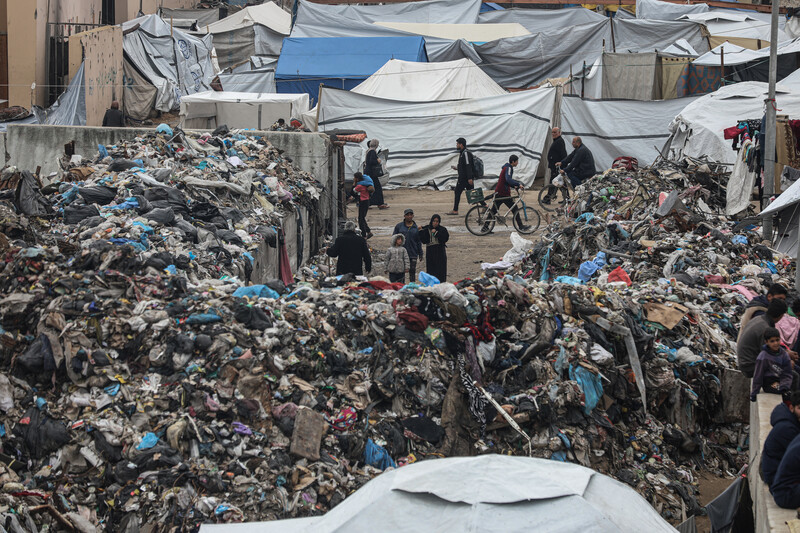The Electronic Intifada 23 May 2025

Displaced Palestinians live in tents in a camp set up in a landfill in the al-Yarmouk neighborhood of Gaza City, 22 March.
APA imagesThis past December, I sat with my 12-year-old brother Louay in the corridor at Nasser Hospital in Khan Younis, waiting. The hospital was crowded with dozens of people, including children. Some were there to ask for medicine, others were trying to see a doctor.
My brother himself was in bad shape.
Over a week before, a number of small rats had invaded our tent. We set up the tent on the rubble of our house in Khan Younis, and it does not provide much of a barrier between those inside and the pests outside.
The rats crawled onto my three younger siblings, including Louay. In the morning, my parents noticed traces of the rats’ presence on our mattresses, blankets, clothes and even food.
They had to dispose of lentils, rice and peas out of fear of contamination. That day, I walked to the water distribution point an hour away and returned with three gallons of water just to wash our blankets.
My mom bathed my three young siblings, too, trying to avoid any illness. But over the week, Louay developed a rash. That rash spread, and the red dots turned into ulcers that covered his body.
Before going to the hospital, I went to a nearby medical tent where a doctor prescribed Louay an antibiotic, but we had no way to access the medicine. It was not available anywhere. Even basic medical supplies are blocked by the occupation, with only small streams of supplies allowed in when Israel grants permission.
We had no choice but to rub olive oil on my brother’s lesions, in the hope it could relieve the itching and swelling. But it didn’t work. Louay couldn’t sleep well at night because of the painful, constant itching.
Life-saving antibiotics
We again tried to find antibiotics for five days and finally found some at a pharmacy in Deir al-Balah, at a steep cost – the price for antibiotics had doubled to $30 from before the war.
Louay started to take them, but his condition only worsened. He had large red bumps from head to toe, and we were afraid of what would happen to him.
That is when my parents had me take him to the hospital.
The doctor at Nasser Hospital was alarmed by Louay’s condition. He determined that it was most likely an allergic reaction to the rats, but that it had developed into a kind of bacterial infection. He said he hadn’t seen such a condition throughout this genocide.
Louay was in agony.
He was admitted to the hospital to receive IV fluids as a basic measure, but the doctor said that they did not have the necessary medication at the time due to the blockade, and that this was the best they could do.
Our room had five other patients’ beds, separated from each other by a curtain. I was scared I would lose my brother, and I spent the nights with him there.
Reign of the rats
Pests have been a problem in Gaza since the early months of the genocide, when trash started to pile up in landfills close to camps where people were forced to live. Now that our homes are destroyed, and huge piles of rubble are more common than standing structures, rats and other rodents have even greater reign over our porous living environments.
According to the United Nations, “The presence of rodents, including rats, can increase the risk of the spread of infectious diseases which the health system in Gaza may be unable to treat.”
Only because of the ceasefire in January 2025 was Louay able to receive the medicine he needed. His rash began to disappear and he gradually returned to normal. If we hadn’t received the medicine during that brief ceasefire, my brother could have died.
Yet now that the ceasefire is officially dead, and no humanitarian or medical supplies are being allowed to enter the Strip, my cousin Yousef, 15, found himself in a state similar to Louay’s.
Yousef and his mother and father had been displaced from their home in Beit Lahiya to a tent in the al-Yarmouk neighborhood of Gaza City, not far from a landfill.
The first night they were in the tent, the family woke to rats crawling on them, and one of them bit Yousef.
Yousef’s father, my uncle Hamdan, tried to find a better shelter for his family, but all the schools, hospitals and streets were filled with tents. They purchased rat traps and put them in different spots inside and outside the tent.
Yousef eventually had to go to the hospital to have the bite on his foot evaluated. The doctor said that if treatment was delayed, Yousef could die.
The only medicines available to Yousef were expired antibiotics. His father found them at a pharmacy and even though the pharmacist warned him that the expired medicines could potentially cause organ damage, the only other option was to leave Yousef’s condition untreated.
His recovery has been excruciatingly painful, but we are fortunate that he is still alive.
Ismael Abdel Raouf is a writer in Gaza.


